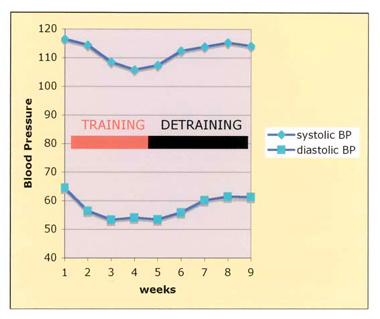| 2005 |

|
YEAR BOOK |
Trinity College Dublin
|
A quick fix from exercise?
|
It is common knowledge that regular exercise has many health benefits including lowering blood pressure and the amount of work done by the heart, with an associated fall in the risk of heart attack or stroke. For this reason, exercise is not only advised as a general health measure but is also a central part of rehabilitation programmes for patients who have suffered heart attacks or undergone cardiac surgery.

A group of healthy young sedentary men took part in 4 weeks exercise training that involved cycling at a moderate rate for 30 minutes 3-4 times weekly. Blood pressure and various other markers of cardiovascular health were measured at weekly intervals during the training period and for a further 4 weeks after training stopped. Surprisingly, almost maximal changes were seen within 2 weeks' training, with blood pressure at rest beginning to fall after even one week ( see Figure ). When training stopped, there was an equally rapid return to pre-training values.
These results show that substantial cardiovascular benefits can be obtained very rapidly by taking up exercise and that the activity does not have to be exhausting. However, the benefits are quickly lost again if one returns to a completely sedentary lifestyle. What we do not know is how little continued exercise is effective in preventing the loss of benefit. Current studies are in progress to define this and to apply the results to cardiac rehabilitation programmes.
Contact: Professor Christopher Bell, Cardiovascular Health Unit,
Department of Physiology, Trinity College, Dublin 2;
E-mail: [email protected] .